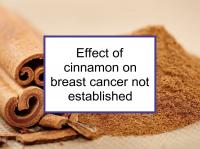Cinnamon is a spice made from the inner bark of the cinnamon tree (Cinnamomum verum or Cinnamomum zeylanicum). It is a dietary source of cinnamaldehyde, cinnamic acid, manganese, calcium and iron and also contains coumarin, eugenol, linalool, salicylic acid, ferulic acid and several carotenoids and anthocyanins.
Cinnamon has been shown to have powerful anti-inflammatory, antifungal, antibacterial, insecticidal and antioxidant properties. Consumption of cinnamon has been shown to improve glucose metabolism, lowering blood sugar and reducing insulin resistance.
Cancer-related effects of consuming cinnamon
Cinnamon extract has been shown to inhibit vascular endothelial growth factor (VEGF), which is crucial to the formation of tumor blood vessels. Cinnamon treatment has also been found to inhibit the expression of regulators of tumor progression in melanoma cells. The same study found that cinnamon treatment enhanced the anti-tumor activities of a type of T cell whose functions include destroying tumor cells. Another study found that cinnamon extract reduced cellular proliferation of myeloid leukemia cells.
Breast cancer and cinnamon
No population studies have investigated the association between cinnamon consumption and risk of breast cancer.
Cinnamic acid has been shown to cause DNA damage and cell death in triple negative (ER-/PR-/HER2-) breast cancer cells. One 2023 study reported preliminary findings that cinnamon extract may increase proliferation of hormone receptor positive (ER+/PR+) breast cancer cells. The authors concluded that cinnamon is "an important ingredient to avoid" in those with breast cancer. On the other hand, a 2024 study found that cinnamon extract reduced the proliferation and growth of ER+/PR+ breast cancer cells.
Cinnamon oil (with major bioactive compound cinnamaldehyde) was demonstrated to increase the treatment effects of doxorubicin chemotherapy in breast cancer cells in one study. Another study reported that cinnamon extract protected against doxorubicin-induced heart damage in experimental rats.
It is possible that cinnamon's marked antioxidant, antifungal, antibacterial, and insecticidal properties derive in part from a somewhat toxic profile that would become more evident if large quantities of cinnamon were to be consumed.
Overall, it appears prudent to limit consumption of cinnamon until more definitive information becomes available.
Additional comments
Ground cinnamon should be purchased organic. Adulteration of spices is prevalent throughout the world. Lead is a favorite admixture because of its weight. For example, in March 2024, the FDA issued an advisory regarding six brands of cinnamon sold in U.S. discount stores that had been found to contain dangerously elevated levels of lead. In July 2024 and October 2025, the FDA updated the advisory to include more brands.
Cinnamomum cassia or Cinnamomum aromaticum, which is also sold as cinnamon but is considered inferior to true cinnamon, is made from the bark of a related tree. It is sometimes marketed as "Cassia," "Chinese cinnamon," "Vietnamese cinnamon," or "Indonesian cinnamon." Cassia has a stronger (some would say harsher) flavor than cinnamon and is more toxic to the liver at lower dosages as a result of its far higher coumarin content.
Sources of information in this webpage
The information above, which is updated continually as new research becomes available, has been developed based solely on the results of academic studies. Clicking on any of the underlined terms will take you to its tag or webpage, which contain more extensive information.
Below are links to 20 recent studies concerning this food or its components. For a more complete list of studies, please click on cinnamon.
